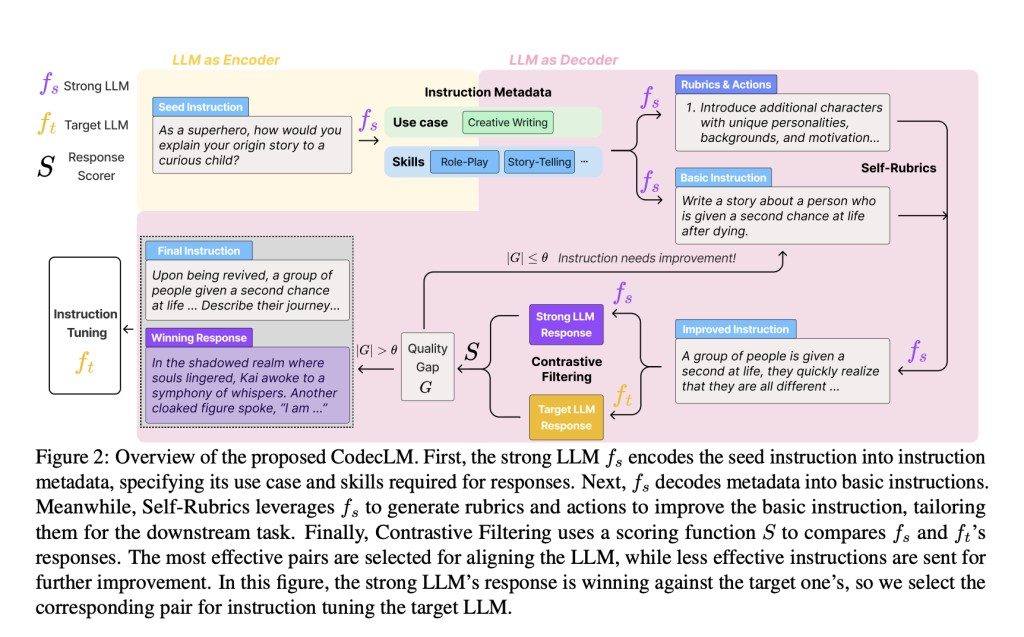Large Language Models (LLMs) are pivotal in advancing natural language processing tasks due to their profound understanding and generation capabilities. These models are constantly refined to better comprehend and execute complex instructions across varied applications. Despite the significant progress in this field, a persistent issue remains: LLMs often produce outputs that only partially adhere to the given instructions. This misalignment can result in inefficiencies, especially when the models are applied to specialized tasks requiring high accuracy.
Existing research includes fine-tuning LLMs with human-annotated data, as demonstrated by models like GPT-4. Frameworks such as WizardLM and its advanced iteration, WizardLM+, enhance instruction complexity to improve model training. Studies by Zhao et al. and Zhou et al. affirm the significance of instruction complexity in model alignment. Additionally, Schick and Schütze advocate for automating synthetic data generation, leveraging LLMs’ in-context learning capabilities. Techniques from knowledge distillation, introduced by Hinton et al., also contribute to refining LLMs for specific instructional tasks.
Researchers at Google Cloud AI have developed CodecLM, an innovative framework designed to align LLMs with specific user instructions through tailored synthetic data generation. CodecLM distinguishes itself by utilizing an encode-decode mechanism to produce highly customized instructional data, ensuring that LLMs perform optimally across diverse tasks. This methodology leverages Self-Rubrics and Contrastive Filtering techniques, enhancing the relevance and quality of synthetic instructions and significantly improving the models’ ability to follow complex instructions accurately.
CodecLM employs an encode-decode approach, transforming initial seed instructions into concise metadata that captures essential instruction characteristics. This metadata then guides the generation of synthetic instructions tailored to specific user tasks. To enhance instruction quality and relevance, the framework utilizes Self-Rubrics to add complexity and specificity and Contrastive Filtering to select the most effective instruction-response pairs based on performance metrics. The effectiveness of CodecLM is validated across several open-domain instruction-following benchmarks, demonstrating significant improvements in LLM alignment compared to traditional methods without relying on extensive manual data annotation.
CodecLM’s performance was rigorously evaluated across several benchmarks. In the Vicuna benchmark, CodecLM recorded a Capacity Recovery Ratio (CRR) of 88.75%, a 12.5% improvement over its nearest competitor. The Self-Instruct benchmark achieved a CRR of 82.22%, marking a 15.2% increase from the closest competing model. These figures confirm CodecLM’s effectiveness in enhancing LLMs’ ability to follow complex instructions with higher accuracy and alignment to specific user tasks.
In conclusion, CodecLM represents a significant advancement in aligning LLMs with specific user instructions by generating tailored synthetic data. By leveraging an innovative encode-decode approach, enhanced by Self-Rubrics and Contrastive Filtering, CodecLM significantly improves the accuracy of LLMs following complex instructions. This improvement in LLM performance has practical implications, offering a scalable, efficient alternative to traditional, labor-intensive methods of LLM training and enhancing the models’ ability to align with specific user tasks.
Check out the Paper. All credit for this research goes to the researchers of this project. Also, don’t forget to follow us on Twitter. Join our Telegram Channel, Discord Channel, and LinkedIn Group.
If you like our work, you will love our newsletter..
Don’t Forget to join our 40k+ ML SubReddit
Want to get in front of 1.5 Million AI Audience? Work with us here
The post Google AI Introduces CodecLM: A Machine Learning Framework for Generating High-Quality Synthetic Data for LLM Alignment appeared first on MarkTechPost.
Source: Read MoreÂ



